
April 20
1871 Ku Klux Act:
With passage of the Third Force Act, popularly known as the Ku Klux Act, Congress authorizes President Ulysses S. Grant to declare martial law, impose heavy penalties against terrorist organizations, and use military force to suppress the Ku Klux Klan (KKK).
Founded in 1865 by a group of Confederate veterans, the KKK rapidly grew from a secret social fraternity to a paramilitary force bent on reversing the federal government's progressive Reconstruction Era-activities in the South, especially policies that elevated the rights of the local African-American population. The name of the Ku Klux Klan was derived from the Greek word kyklos, meaning "circle," and the Scottish-Gaelic word "clan," which was probably chosen for the sake of alliteration. Under a platform of philosophized white racial superiority, the group employed violence as a means of pushing back Reconstruction and its enfranchisement of African-Americans. Former Confederate General Nathan Bedford Forrest was the KKK's first grand wizard and in 1869 unsuccessfully tried to disband it after he grew critical of the Klan's excessive violence.
Most prominent in counties where the races were relatively balanced, the KKK engaged in terrorist raids against African-Americans and white Republicans at night, employing intimidation, destruction of property, assault, and murder to achieve its aims and influence upcoming elections. In a few Southern states, Republicans organized militia units to break up the Klan. In 1871, passage of the Ku Klux Act led to nine South Carolina counties being placed under martial law and thousands of arrests. In 1882, the U.S. Supreme Court declared the Ku Klux Act unconstitutional, but by that time Reconstruction had ended, and the KKK had faded away.
The 20th century would see two revivals of the KKK: one in response to immigration in the 1910s and '20s, and another in response to the African-American civil rights movement of the 1950s and '60s. (History.com)
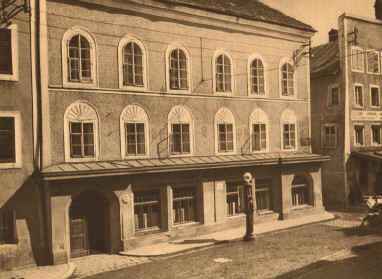
1889 Birth: Adolf Hitler enters the world he is destined to alter so drastically: He is born between 6:00 and 6:30 PM, on the third floor of the Gasthof zum Pommer, Braunau am Inn. Although the family originaly came from the Waldviertel quarter of Lower Austria, because of his father's posting, they were at the time in the Innviertel region of Upper Austria, the north-western state of Austria. Franziska Pointecker is the midwife. [For further details, Click here.]
True or False:Hitler was Jewish with a Rothschild ancestor; Hitler had only one testicle; Hitler had two testicles, but one was bitten off by a goat; Hitler was a homosexual; Hitler once lived in Liverpool, England; Hitler was insane; Hitler was a great military leader; Hitler was a Pagan Mystic; Hitler was an omnivore; Hitler contracted syphilis from a French prostitute during World War I; Hitler was an artist; Hitler was a Draft Dodger; Hitler took Golden Showers on alternate Thursdays; Hitler knew nothing about the Holocaust and would have disapproved had he known; Hitler's 'real' name was Schicklgruber; Scientists have cloned Hitler's lip, and it's growing a mustache; Hitler never wanted war but was forced into it by an 'International Jewish/Marxist/Capitalist Conspiracy'; Hitler had foreknowledge of the Pearl Harbor attack; Hitler caused the Cold War; Hitler escaped his presumed death in the bunker and is at this very moment playing cards with Elvis.
1902 Curies isolate radium:
Marie and Pierre Curie successfully isolate radioactive radium salts from the mineral pitchblende in their laboratory in Paris. In 1898, the Curies discovered the existence of the elements radium and polonium in their research of pitchblende. One year after isolating radium, they would share the 1903 Nobel Prize in physics with French scientist A. Henri Becquerel for their groundbreaking investigations of radioactivity.
Marie Curie was born Marie Sklodowska in Warsaw, Poland, in 1867. The daughter of a physics teacher, she was a gifted student and in 1891 went to study at the Sorbonne in Paris. With highest honors, she received a degree in physical sciences in 1893 and in mathematics in 1894. That year she met Pierre Curie, a noted French physicist and chemist who had done important work in magnetism. Marie and Pierre married in 1895, marking the beginning of a scientific partnership that would achieve world renown.
Looking for a subject for her doctoral thesis, Marie Curie began studying uranium, which was at the heart of Becquerel's discovery of radioactivity in 1896. The term radioactivity, which describes the phenomenon of radiation caused by atomic decay, was in fact coined by Marie Curie. In her husband's laboratory, she studied the mineral pitchblende, of which uranium is the primary element, and reported the probable existence of one or more other radioactive elements in the mineral. Pierre Curie joined her in her research, and in 1898 they discovered polonium, named after Marie's native Poland, and radium.
While Pierre investigated the physical properties of the new elements, Marie worked to chemically isolate radium from pitchblende. Unlike uranium and polonium, radium does not occur freely in nature, and Marie and her assistant Andre Debierne laboriously refined several tons of pitchblende in order to isolate one-tenth gram of pure radium chloride in 1902. On the results of this research, she was awarded her doctorate of science in June 1903 and later in the year shared the Nobel Prize in physics with her husband and Becquerel. She was the first woman to win a Nobel Prize.
Pierre Curie was appointed to the chair of physics at the Sorbonne in 1904, and Marie continued her efforts to isolate pure, non-chloride radium. On April 19, 1906, Pierre Curie was killed in an accident in the Paris streets. Although devastated, Marie Curie vowed to continue her work and in May 1906 was appointed to her husband's seat at the Sorbonne, thus becoming the university's first female professor. In 1910, with Debierne, she finally succeeded in isolating pure, metallic radium. For this achievement, she was the sole recipient of the 1911 Nobel Prize in chemistry, making her the first person to win a second Nobel Prize.
She became interested in the medical applications of radioactive substances, working on radiology during World War I and the potential of radium as a cancer therapy. Beginning in 1918, the Radium Institute at the University of Paris began to operate under Curie's direction and from its inception was a major center for chemistry and nuclear physics. In 1921, she visited the United States, and President Warren G. Harding presented her with a gram of radium . . . .
Marie Curie died in 1934 from leukemia caused by four decades of exposure to radioactive substances. (History.com)
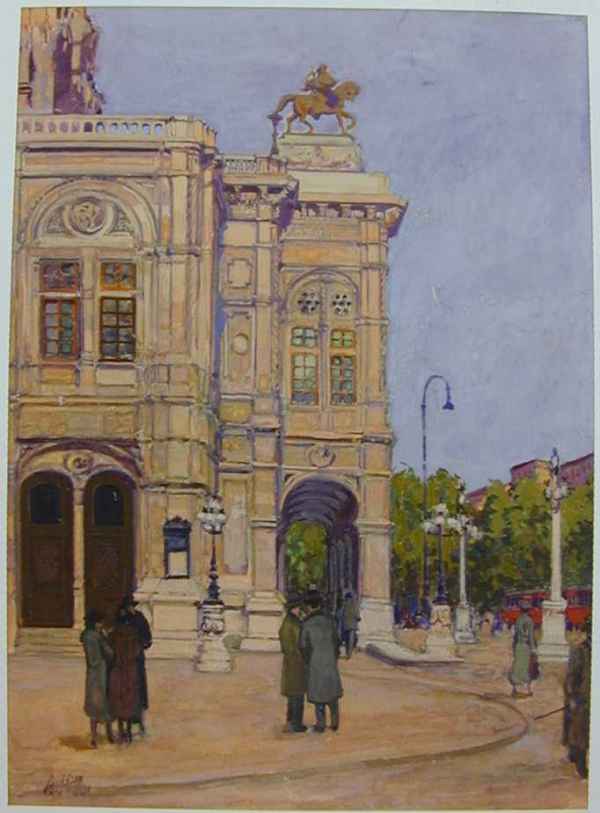
1913 Starving artist Adolf Hitler celebrates his twenty-fourth birthday: He is now eligible to collect his inheritance from his father, which he immediately applies for. [For further details, Click here.]

1914 The Tabasco Incident: President Woodrow Wilson requests authorization from Congress to use military force to pressure Mexico. Note: Although not directly relevant to the First World War the so-called 'Tampico Incident' did play its part in subsequently straining US-German relations in early 1917.
It is my duty to call to your attention to a situation which has arisen in our dealings with the General Victoriano Huerta at Mexico City which calls for action, and to ask your advice and cooperation in acting upon it. On the 9th of April a paymaster of the USS Dolphin landed at the Iturbide Bridge landing at Tampico with a whaleboat and boats' crew to take off certain supplies needed by his ship, and while engaged in loading the boat was arrested by an officer and squad of men of the army of General Huerta ... Admiral Mayo regarded the arrest as so serious an affront that he was not satisfied with the flag of the United States be saluted with special ceremony by the military commander of the port. The incident can not be regarded as a trivial one, especially as two of the men arrested were taken from the boat itself - that is to say, from the territory of the United States - but had it stood by itself it might have been attributed to the ignorance or arrogance of a single officer. Unfortunately, it was not an isolated case.

1915 World War I: List Regiment: Gefreiter Adolf Hitler's 16 Reserve Infantry Regiment occupy a position, at Fromelles (pictured above in a drawing by Hitler), which is on a level field with water channels, willow trees and willow stalks, in the distance towards the enemy lines lie an insignificant wood with barbed wire entanglements. Under the direction of their defense-minded commander, Lieutenant General Gustav Scanzoni von Lichtenfels, the regiment works ceaselessly day and night in the subsequent weeks, to further fortify their position at Fromelles. [For further details, Click here.]
1916 World War I: Various:
The Lafayette Escadrille: a French squadron made up of American volunteers, flies in action for the first time on the Western Front.
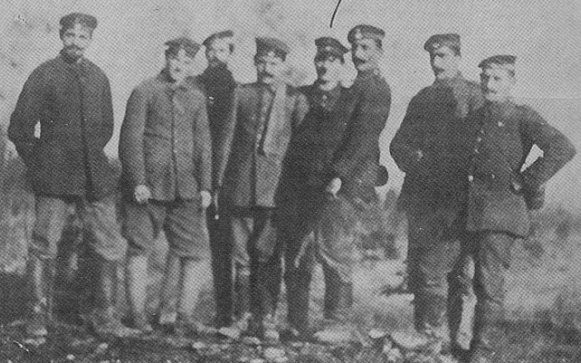
List Regiment: Gefreiter Adolf Hitler endures trench warfare in Flanders (Artois) with 3 Company, 16 Reserve Infantry Regiment. [For further details, Click here.]
1917 World War I: Various:
Nivelle Offensive ends in failure: An ambitious Allied offensive against German troops near the Aisne River in central France, spearheaded by the French commander in chief, Robert Nivelle, ends in dismal failure.
Nivelle, who had replaced Joseph Joffre in December 1915 as head of all French forces, had tenaciously argued for a major spring offensive in spite of powerful opposition in the French government, at one point threatening to resign if the offensive did not go ahead. He was convinced that by implementing the tactics he had used to considerable success at Verdun during the French counter-attacks in the fall of 1916, on a greater scale, the Allies could achieve a breakthrough on the Western Front within 48 hours.
In preparation for the planned offensive at the Aisne River, the British army began its attacks on April 9 around the town of Arras, capital of the Artois region of France, with the limited objective of pulling German reserve troops away from the Aisne, where the French would launch the central thrust of the offensive. Of the nearly 1,000 heavy guns used in the attacks, 377 were aimed at a six-kilometer stretch of front facing Vimy Ridge, a high point overlooking the plains of Artois, France, to the east. The Canadian Corps was given the task of moving forward to capture the ridge itself, directed by photographic images taken by aerial reconnaissance crafts used to plan the attacks as well as to report progress during their execution. After overcoming 4,000 yards of German defenses, the Canadians captured Vimy Ridge on April 12—a national triumph for Canada and a successful outcome for the initial phase of the Nivelle Offensive, as the Germans were forced to double their strength in the Arras region and thus draw forces away from the area further south, where Nivelle was preparing to launch his attacks.
On April 16, Nivelle and the French began their assault along an 80-kilometer front stretching from Soissons to Reims along the Aisne River. Despite the evacuation of reserve troops to Arras, the German positions were deeply and strongly entrenched in the region, which they had occupied since September 1914. The Germans had ample warning of French intentions from their intelligence systems; this, combined with the depth of their positions, meant that the Allies were literally outgunned from the beginning of the battle. The overconfident Nivelle had ordered a rate of advance of up to two kilometers per hour, which proved exceedingly difficult with the steep grade of the land, horrible weather and the strength of enemy fire.
For this attack, known as the Second Battle of the Aisne, the French used tanks in great numbers for the first time; by the end of the first day, however, 57 of 132 tanks had been destroyed and 64 more had become bogged down in the mud. All in all, the French suffered 40,000 casualties on April 16 alone, a loss comparable to that suffered by the British on the first day of the Somme offensive of July 1, 1916. It was clear from the start that the attack had failed to achieve the decisive breakthrough Nivelle had planned: over the next three days, the French made only modest gains, advancing up to seven kilometers on the west of the front and taking 20,000 German prisoners. On the rest of the front, progress was significantly slower, and Nivelle was forced to call off the attacks on April 20.
The high casualty rate among French forces during the ill-fated Nivelle Offensive, combined with the continuing effects of exhausting battles at Verdun and the Somme, led to sharply increased discontent among the soldiers on the Western Front. Mutinies began in late April 1917, and by June had affected 68 divisions, or about 40,000 troops. The army's response to this was quick: on April 25, Nivelle was dismissed as commander in chief. He was replaced by the more cautious Philippe Petain, the hero of the Verdun resistance, on May 8. Petain immediately responded to the soldiers' complaints, knowing that mutinies must be quelled in order to have a hope of success on the battlefield. Where Nivelle had cut soldiers' leave in March 1917, releasing only 5 percent of the army at a time, Petain increased it, establishing a standard of 13 percent, or ten days' leave for each soldier every four months. (History.com)
List Regiment: Gefreiter Adolf Hitler's 16 Reserve Infantry Regiment, 3 Company, fortify trenches near Arras. [For further details, Click here.]
1918 World War I: Various:
Manfred von Richthofen—aka The Red Baron—shoots down his 79th and 80th victims marking his final victories before his death the following day.
List Regiment: Gefreiter Adolf Hitler's 16th RIR constructs fortified works in difficult defensive positions on an active front with German assault regiments near Fountaine (Montdidier). [For further details, Click here.]
1919 Polish-Russian War: The Polish Army captures Vilna, Lithuania from the Soviet Army.
1920 Birth: Ronald Speirs: World War II Veteran:
Speirs parachuted into Normandy on June 6, 1944 (or D-Day) and quickly met with fellow troops at their makeshift command post at an empty farmhouse. He rounded up a few men, moved out, and helped in the capturing of the fourth 105 mm howitzer at the Brecourt Manor Assault. Soon after, rumors began circling that Speirs had killed twenty or thirty POW's after handing them cigarettes and giving them a light. Speirs has never denied nor confirmed the rumors. In 1958 he became the American Governor of the Spandau Prison in Berlin, the same place Rudolf Hess was serving his life term. In Albert Speer's book, Spandau: The Secret Diaries he mentions a hard-nosed, irritating US Commandant, but not by name. This commandant has since been identified as Ronald Speirs.
1921 Adolf Hitler receives a book from Dr. Babette Steininger, an early Nazi member, as a birthday present. The book is an essay by Tagore, an Indian mystic and nationalist. On the book's fly-leaf, a handwritten inscription from Steininger reads "to Adolf Hitler my dear Armanen-Brother." (THP)
1923 Julius Streicher founds—and becomes editor of—the racist newspaper Der Stuermer (The Stormer), subtitled: A German Weekly in The Struggle for Truth. Julius Streicher:
The speeches and articles which I wrote were meant to inform the public on a question which appeared to me one of the most important questions. I did not intend to agitate or inflame but to enlighten. Anti-Semitic publications have existed in Germany for centuries. A book I had, written by Dr. Martin Luther, was, for instance, confiscated. Dr. Martin Luther would very probably sit in my place in the defendants' dock today, if this book had been taken into consideration by the Prosecution. In the book The Jews and Their Lies, Dr. Martin Luther writes that the Jews are a serpent's brood and one should burn down their synagogues and destroy them . . . .
Even before the coming to power, there were, in every Gau, weekly journals that were anti-Semitic, and one daily paper called the Völkischer Beobachter in Munich. Apart from that, there were a number of periodicals which were not working directly for the Party. There was also anti-Semitic literature.
1923 In the evening of his thirty-fourth birthday, Hitler speaks on a well-worn theme, "Politics and Race: Why We Are Anti-Semites," before a crowd of 9,000 at the Circus Krone. It is around this time that the 'Hitler Greeting'—Heil Hitler—begins to be heard among the already common 'Heils'.
1924 On Hitler's thirty-fifth birthday, while he is locked in a prison cell after the failed Putsch, is celebrated at Munich's Bürgerbräukeller "in honor of the man who had lit the present flame of liberation and Völkisch consciousness in the German people."

Landsberg Prison warder Franz Hemmrich recalled lunchtime at Landsberg:
Shortly before twelve o'clock they would spread the cloth for dinner in the common room. This cloth didn't properly come under orders, but the convicts instituted it and we made no demur. They brought the meal in one large vessel and served it to the prisoners. As a rule the meal consisted of but one dish. Everyone waited for Hitler, each standing erect behind his own chair. When the leader appeared there was a cry of "tenshun!"and he strode to the top of the table, and remained standing, until every man in turn came forward with his table-greeting. Then all sat down and fell to.
Warder Hemmrich explained how he "supervised" Hitler's visits:
I used to "take" Hitler's visits in a room set apart for the purpose . . . . In the course of so many but so brief interviews Hitler developed an extraordinary terseness and fluidity of expression. It often went severely against the grain to me to bring these to a close. The moment, however, I made a sign that time was up, Hitler broke off, and withdrew . . . .
It was really a wonderful experience to listen to Hitler in face-to-face conversation. I don't know anyone whose personality was so overwhelming. As a rule when I had to "take" one of these visits, I made a point of having a newspaper on hand, in which for appearances" sake I could appear to immerse myself. Very often, though, I just used it to screen the intense interest I myself was feeling in the conversation.
Hitler's way of putting things was not mere talking: he made you feel the point come right home: you yourself experienced every word . . . . throughout his whole ten months [including pretrial confinement], Hitler never talked to us officers directly on the subject. Yet I don't think I should be off the mark if I were to say that before we saw the last of him everyone here, from the Governor to the furnace man, had become a convinced believer in his ideas.
1924 In response to a March 26 inquiry by Bavaria, Austria officially confirms Hitler's Austrian citizenship and states that he will be allowed entry into Austria at Passau should he be deported from Germany. While there will be some problems in Austria concerning this issue, with some confusion created at the Passau border station as to whether Hitler was or was not actually approved to enter there, the main point is that at no time is his status as an Austrian citizen altered. This state of affairs leaves open the possibility that he could be legally deported at any time.
1926 April 20 From Goebbels' diary:
We celebrate Hitler's birthday. He is thirty-seven. Flowers surrounded by thirty-seven candles. And he talks about November 9, 1923. Adolf Hitler, I love you, because you are both great and simple. A genius! Leave-taking from him. Farewell! He waves. I grant audiences.
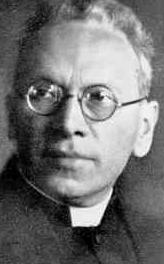
1933 Church and Reich: On Hitler's 44th birthday, his first since becoming leader of Germany, Monsignor Kaas sends a telegram of congratulations from Rome that is widely published in the German press. Kaas assures Hitler of "unflinching cooperation." This undoubtedly accelerates the movement of Catholics into the Nazi camp. (THP)
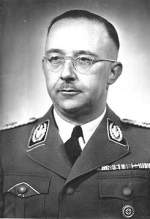
1934 Himmler is appointed inspector of the (Prussian) Gestapo:
Parallel to the development of the Gestapo in Prussia, the Reichsfuehrer-SS, Heinrich Himmler, created in Bavaria the Bavarian Political Police and also directed the formation of political police forces in the other federal states outside of Prussia. The unification of the political police of the various states took place in the spring of 1934 when Hermann Goering appointed Himmler the Deputy Chief of the Prussian Gestapo in place of the former Deputy Chief, Diels. Himmler thereby obtained unified control over the political police forces throughout the Reich. [For further details, Click here.]
[The Gestapo was originally the secret police in Prussia, known as the Geheime Staatspolizei. I understand that the shortened form was the brainwave of a post-office clerk, for use on rubber stamps.‑‑Ed.]
1939 Various:
Hitler celebrates his 50th birthday with the largest military display in German history, as representatives of the US, Britain and France look on.
Holocaust: Joint hearings of the US House and Senate are held concerning the admission, on a non-quota basis, of 20,000 German Jewish children over a two-year period. (THP)
1941 World War II: From official notes of the German naval war staff:
Naval Supreme Commander with Fuehrer. Navy Supreme Commander asks about result of Matsuoka's visit and evaluation of Japanese-Russian pact . . . . Fuehrer has informed Matsuoka 'that Russia will not be touched if she behaves in a friendly manner according to the treaty. Otherwise, he reserves action for himself.' Japan-Russia pact has been concluded in agreement with Germany and is to prevent Japan from advancing against Vladivostok and to cause her to attack Singapore.
1942 World War II: Various:
Vichy France: Premier Pierre Laval, in a radio broadcast, establishes a policy of 'true reconciliation with Germany.'
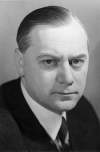
Hitler's Birthday: "You who carry the flags and banners and who march behind them, remember that you are fighting for the greatest cause that Germans have fought for in a thousand years, and do not forget who also gave you the symbol that goes with the idea: Hitler!" -Alfred Rosenberg.
Stalin to FDR:

The Soviet Government agrees that it is essential to arrange a meeting between V.M. Molotov and you for an exchange of views on the organization of a second front in Europe in the near future . . . . It goes without saying that Molotov will also go to London to exchange views with the British Government. I have no doubt that I shall be able to have a personal meeting with you, to which I attach great importance, especially in view of the big problems of organizing the defeat of Hitlerism that confront our two countries. Please accept my sincere regards and wishes for success in the struggle against the enemies of the United States of America.
Tiger (tank): The first prototype of (P) is completed in time for a demonstration on Hitler's birthday. However Tiger (P) will encounter serious complications and manufacturing will have to be suspended many times.
1943 Various:
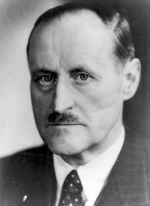
The Secret Diary of Anti-Hitler Conspirator Ulrich von Hassel:
The longer the war lasts, the lower my esteem for the generals sinks. Admittedly, they have professional ability and physical courage, but little moral courage, absolutely no over-all or international view. Nor have they the least spiritual or intellectual independence or resistance based on true culture. They are accordingly unable to deal with a man like Hitler and absolutely at his mercy. In addition, the majority regard career in the worst sense, money and the field marshal's baton, as more important than the great principles and moral values that are at stake. All those on whom hopes had been set have proved worthless. And in the most miserable fashion: they agree to everything one says to them and join in the wildest plans but cannot summon up the courage to act.
Alfred Rosenberg to Hitler on his birthday:
I beg of you, my Fuehrer, to give me a chance during my next audience to report to you orally on the whole extent and state of this art-seizure action. I beg you to accept a short, written, preliminary report of the progress and extent of the art-seizure action, which will be used as a basis for this later oral report, and also to accept three volumes of the provisional picture catalogues which, too, show only a part of the collection at your disposal. I shall deliver further catalogues, which are now being compiled, as they are finished. These photos represent an addition to the collection of 53 of the most valuable objects of art delivered some time ago to your collection. This folder also gives only a weak impression of the exceptional value and extent of these objects of art, seized by my service command (Dienststelle) in France and put into a safe place in the Reich. I shall take the liberty during the requested audience to give you, my Fuehrer, another 20 folders of pictures with the hope that this short occupation with the beautiful things of art, which are so near to your heart, will send a ray of beauty and joy into your care-laden and revered life.
Warsaw Ghetto Revolt: Himmler promises to crush Jewish resistance, remarking that dead Jews will make a fine birthday present for Der Fuehrer.
As soon as the units had entered, strong concerted fire was directed at them by the Jews and bandits. The tank employed in this operation and the two SPW [heavy armored cars] were attacked with Molotov cocktails. The tank was twice set on fire. This attack with fire by the enemy caused the units employed to withdraw in the first stage. Losses in the first attack were 12 men (6 SS men, 6 Trawnicki men). About 08.00 hrs. the units were sent in again under the command of the undersigned. Although there was again a counterattack, in lesser strength, this operation made it possible to comb out the blocks of buildings according to plan. We succeeded in causing the enemy to withdraw from the roofs and prepared elevated positions into the cellars, bunkers and sewers. Only about 200 Jews were caught during the combing-out operation. Immediately afterwards shock-troop units were directed to known bunkers with orders to pull out the occupants and destroy the bunkers. About 380 Jews were caught in this operation.
1945 World War II: Various:
War with Japan: US B-29 bombers destroy the Musashi Aircraft plants, halting production of Nakajima Ki-84 fighter planes.
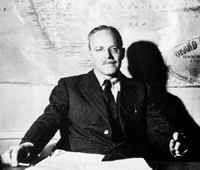
OSS chief Allen Dulles is ordered by the US Joint Chiefs of Staff to cut off any further negotiations with German emissaries. (Waller)
Western Front: The US Seventh Army and other Allied forces take control of the German cities of Nuremberg and Stuttgart. US troops capture Leipzig, Germany, only to later cede the city to the Soviet Union. [See: The Last Days of the Third Reich.]
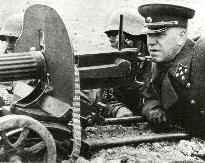
Eastern Front: Marshal Ivan Konev's 1st Ukrainian Front breaks through the last formations of Army Group Center. Soviet tanks reach the outskirts of Berlin. Marshal Georgy Zhukov's 1st Belorussian Front begins shelling Berlin's Zentrum. German defences, most of which are commanded by Helmuth Weidling, consist only of a couple of depleted and poorly equipped Wehrmacht and Waffen-SS divisions, supplemented by Volkssturm and Hitler Youth members. Meanwhile, US troops capture Leipzig, Germany, but will later have to hand the city over to the Soviets.
From Nazi propagandist Hans Fritzsche's testimony before the IMT: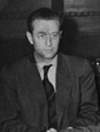
The most impressive false news of which I was a victim was given out in the last few days of the war. I must describe it for the sake of clearing up matters. In the days when Berlin was surrounded by the Russian Army the people of Berlin were told that a relief army, the army of General Wenck, was marching on Berlin; that there was no more fighting on the Western Front. The news was given out that Ribbentrop had gone to the Western Front and had concluded a treaty there, and handbills were printed in Berlin which contained approximately this text: "Soldiers of the Wenck army, we Berliners know that you are as far as Potsdam. Hurry, come quickly, help us." These handbills were printed at a time when the Wenck army no longer existed and had already been captured. These handbills were apparently dropped over Berlin inadvertently and were to give the inhabitants of Berlin new courage. That happened in the days when Hitler, according to Speer's testimony, had already told his entourage that there was no use trying to do anything for the rest of the German people.
Operation Corncob is launched: Allied bombers in Italy begin a three-day attack on the bridges over the rivers Adige and Brenta to cut off German lines of retreat on the peninsula.
Holocaust: A Gestapo reign of terror results in the hanging of 20 Russian prisoners of war and 20 Jewish children: Of these, at least nine are under the age of 12. All of the victims had been taken from Auschwitz to Neuengamme, the place of execution, for the purpose of medical experimentation.
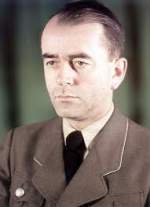
Speer—before leaving for Hitler's birthday get-together at the Fuehrerbunker—gives his final instructions to Theodor Hupfauer, his right-hand man. Hupfauer will later tell Gitta Sereny:
He handed me a letter with precise instructions. It said—and he repeated all this when we talked—that Hitler had not made the final decision whether to stay in Berlin or go north or south, but that whichever it was, Speer would stay with him. If Hitler - and Speer - went north, I was to stay in the south; if Hitler and Speer came south, I was to somehow make my way north. Anyway, I was to take over wherever Speer would not be. One thing is certain, though; Speer was sure he would be needed by the Allies. I said, 'For heaven's sake, we are going toward complete annihilation; nobody will want any of us.' But Speer said, 'Yes, they will need me. They will need my knowledge.' (Sereny)
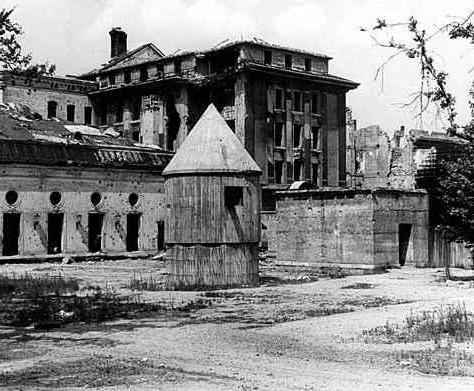
Hitler celebrates his 56th birthday in his Berlin bunker: With the Russians at the gates of Berlin, the increasingly deranged dictator receives the murmured birthday greetings of his entourage with a limp handshake and a vacant expression. Present to wish their Fuehrer well are Goering, Goebbels, Himmler, Speer, Doenitz, Ribbentrop, Keitel, Kaltenbrunner, and various generals.
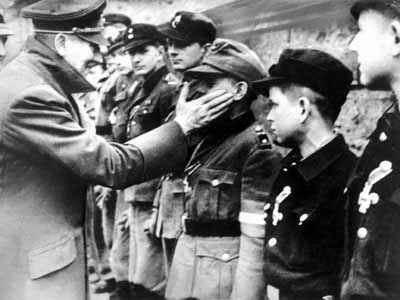
1950 Spandau Prison: From Spandau: The Secret Diaries, by Albert Speer:
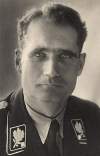
"Herr Speer, I have my memory back!" Hess exclaims as he comes toward me. "Want me to prove it?" Unasked, he bursts out with detailed information on literature and history, referring mostly matters I know nothing about. Can the psychiatrist have produced this cure? (Speer II) [See: Was Rudolf Hess 'Crazy'?]
1952 Spandau Prison: From Spandau: The Secret Diaries, by Albert Speer:
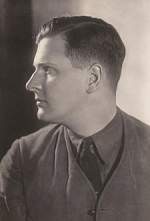
Each of us has spells of bad temper and prison psychosis. At the moment Schirach seems to have gone into a tailspin. He has openly broken with me and no longer even responds to my greetings. Why, I don't know. (Speer II)
1953 Spandau Prison: Albert Speer smuggles a letter out of the prison addressed to his friend and archivist, Rudolf Wolters:
I can see you would like me to be more positive about Hitler. But if I'm to write honestly, I cannot do that. That would really be falsification of subjective[sic] truth. This kind of embellishment happens to most writer of memoirs which, probably unconsciously, they repress the negative aspects of their lives or the events they describe . . . . Perhaps this is what is happening already now in our country and to our people. It is, in the final analysis too painful to face that one has sacrificed children or parents for ideals one can now only condemn. I fear that, just as happened after Napoleon's fall, when for a long time only negative opinions were voiced, this restraint may repeat itself here—just as happened then—result in a historical rebound, with German historians fifteen or twenty years from now presenting a Hitler repainted in positive colors . . . .
You criticize me for calling Hitler a criminal and you are of course right that, as this is a value judgement which the reader should make for himself, it is appropriate in a book of memoirs. But if I say it, not once but many times, then I do so deliberately, in a way to remind myself. Of what? Of what I learned so graphically in Nuremberg: that upon his orders families—yes, imagine it, families—a man with his wife and small children—had to die [mussen in den Tod gehen] just because they were Jews. Being myself the father of young children, I have sufficient imagination to picture myself in their place . . . .
Of course, nobody who was close to Hitler, or committed to him, wants to hear this. I understand that and expect furious attacks. As I am by nature weak, I prefer to put them off until after I'm dead. But I need for you to believe, firstly that I am aware of what I risk if I continue in this vein, but secondly, that I hope to God that I will have the strength to go on doing so. I beg of you to take very seriously what I am saying here, for putting it into words is very, very difficult for me, and I probably can't do it again. (Sereny)
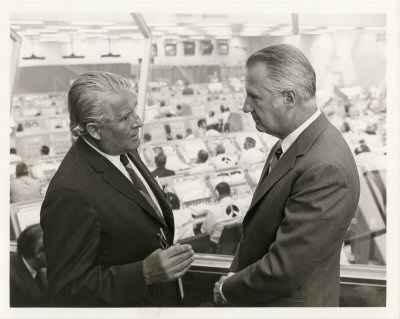
1961 Wunderwaffen: President Kennedy sends a five-page memorandum to Vice President Johnson, whom he had appointed the chairman of the National Aeronautics and Space Council (NASC). Excerpt:
Do we have a chance of beating the Soviets by putting a laboratory into space, or a trip to the moon, and back, with a man? Is there any other space program which promises dramatic results in which we could win?
[See: Wunderwaffen: Hitler's Deception and the History of Rocketry.]1968 United Kingdom: Rivers of Blood: British Member of Parliament Enoch Powell made his controversial "Rivers of Blood" speech in opposition to immigration and anti-discrimination legislation, resulting in his removal from the Shadow Cabinet. [However controversial his prediction, it does seem to have been correct, at least in terms of people's attitudes today.‑‑Ed.]
1985 The Covenant, The Sword, and the Arm of the Lord:
ATF raid on compound in northern Arkansas. The CSA was an organization that believed doomsday was imminent, and the 250-acre compound that was set up in Elijah became a community for its members. There they trained their members in paramilitary operations. The group strongly believed in white supremacy, and held a particularly strong sense of anti-Semitism. They believed that the United States government needed to be overthrown, and expressed the need to eliminate federal agents and all those who are involved in the workings of the government. [For further details, Click here.]
1998 The German terrorist group Red Army Faction announces its dissolution after 28 years: The RAF operated from the 1970's to 1998, causing great civil unrest, especially in the autumn of 1977, which led to a national crisis that became known as "German Autumn." It is responsible for 34 deaths including many secondary targets such as chauffeurs and bodyguards and many injured in its almost 30 years of existence.
2001 Russian neo-Nazis mark Adolf Hitler's birthday by killing a Chechen youth in Moscow: The attack took place near a crowded shopping mall less than a hundred meters from the Kremlin on Friday night. The 18-year-old Chechen was stabbed when pursuing two skinheads who hurled abuses at him and his friends, also Chechens. One of the attackers was detained and authorities said the other would also be apprehended as his name was already known to the police. [For further details, Click here.]
Edited by Levi Bookin (Copy editor)
levi.bookin@gmail.com



Click to join 3rdReichStudies

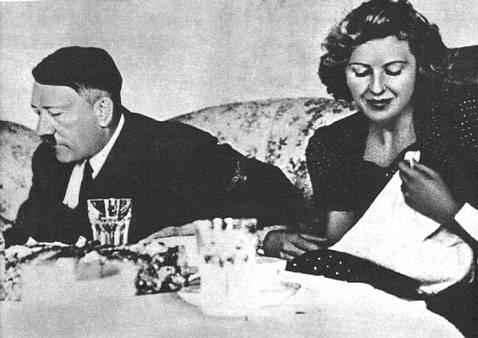
Please note that the list-owner and the moderator are not responsible for, and do not necessarily approve of, the random ads placed on our pages by our web server. They are, unfortunately, the price one pays for a 'free' website.
FAIR USE NOTICE: This site may contain copyrighted material the use of which has not always been specifically authorized by the copyright owner. We are making such material available in our efforts to advance understanding of historical, political, human rights, economic, democracy, scientific, environmental, and social justice issues, etc. We believe this constitutes a 'fair use' of any such copyrighted material as provided for in section 107 of the US Copyright Law. In accordance with Title 17 U.S.C. Section 107, the material on this site is distributed without profit to those who have expressed a prior interest in receiving the included information for research and educational purposes. If you wish to use copyrighted material from this site for purposes of your own that go beyond 'fair use', you must obtain permission from the copyright owner.